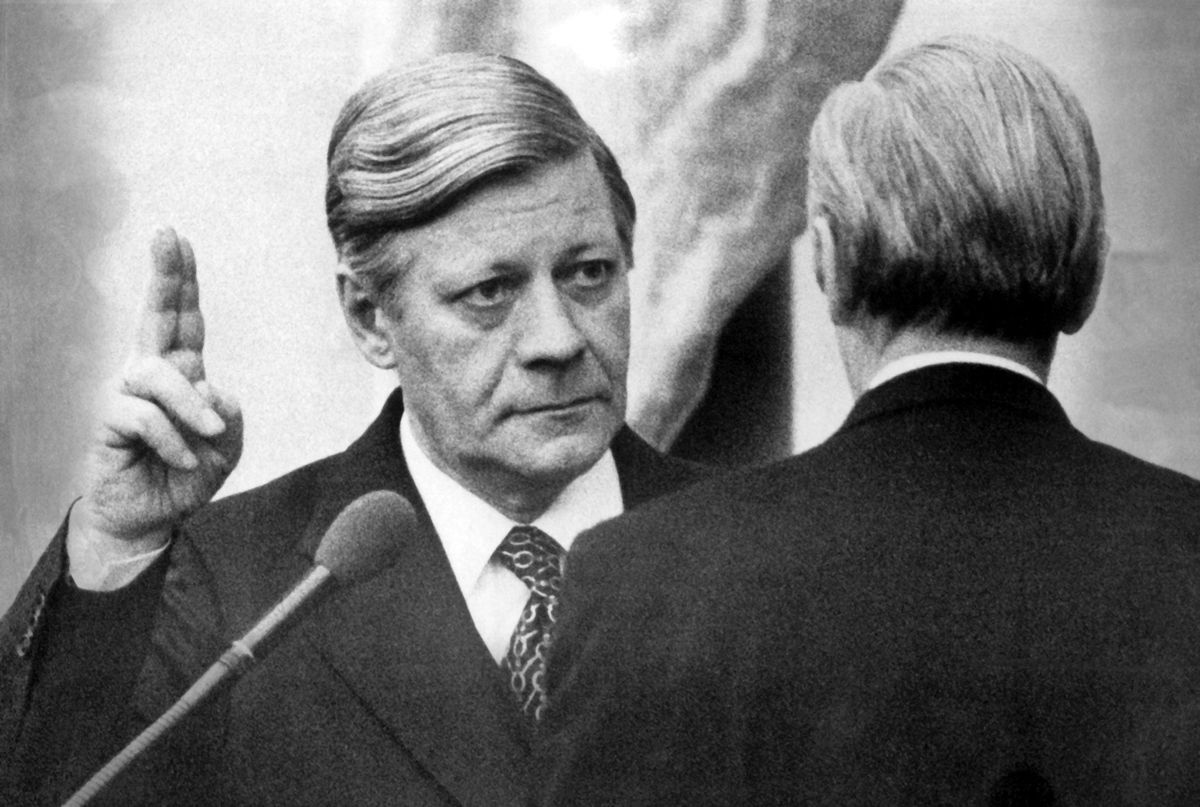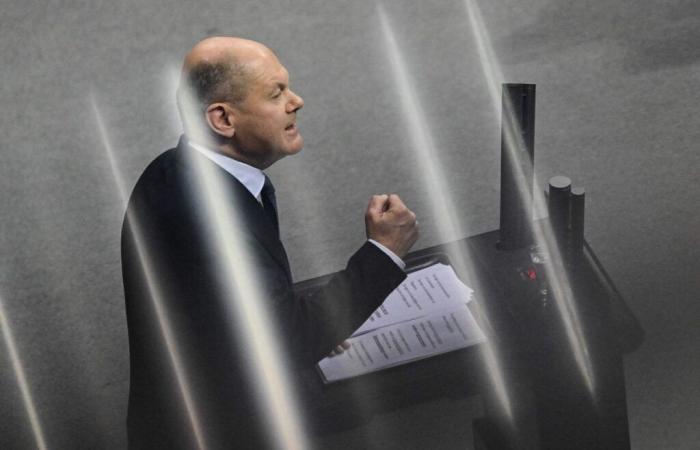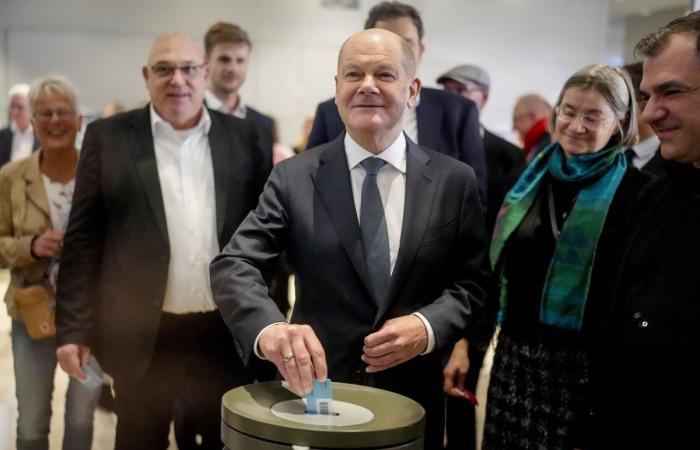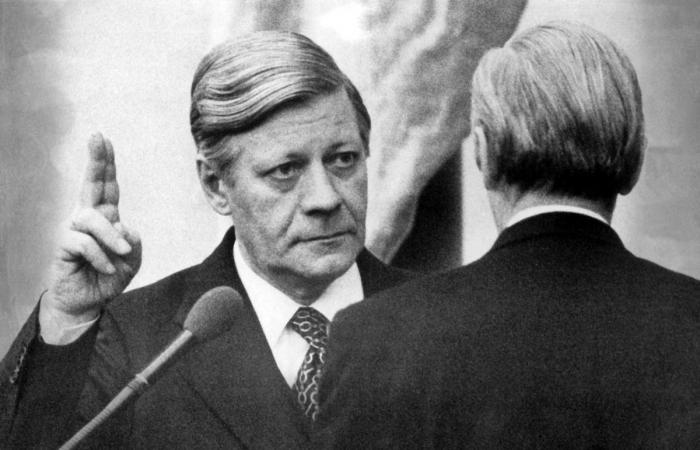New elections in February –
German Bundestag withdraws its confidence in Olaf Scholz
The Bundestag has withdrawn its confidence in the Chancellor, paving the way for new elections on February 23rd.
Published today at 1:02 p.m
Here you will find additional external content. If you agree that cookies are set by external providers and personal data is thereby transmitted to external providers, you can allow all cookies and display external content directly.
Allow cookiesMore info
Subscribe now and benefit from the read-aloud function.
BotTalk
Chancellor Olaf Scholz (SPD) missed the majority in the Bundestag vote of confidence, as he had aimed for. In the roll-call vote on Monday, 207 MPs expressed their confidence in the Chancellor, 394 MPs voted against and 116 abstained. With the lack of a majority, the path to new elections to the Bundestag on February 23rd is open – the final decision to dissolve the Bundestag rests with the Federal President.
One last rumble against the FDP
Scholz used his last speech to strongly criticize the former coalition partner FDP. Its “weeks of sabotage” had damaged not only the government, but also democracy as a whole, he said. “To join a government requires the necessary moral maturity.” In his response, CDU/CSU parliamentary group leader and candidate for chancellor Friedrich Merz called the attack “not only disrespectful,” but also a “sheer impudence.”
Olaf Scholz in front of the Bundestag.
AFP
Scholz’s “traffic light” coalition collapsed on November 6th in the dispute over the debt brake. At the time, Scholz had fired Finance Minister and FDP leader Christian Lindner. Lindner had resisted suspending the debt brake.
Scholz confirmed in the Bundestag that he was asking the vote of confidence with the aim of bringing parliamentary elections forward by seven months. “In this election, the citizens can set the political course of our country, that’s what it’s all about,” he told MPs. “I am therefore addressing the vote of confidence to the voters today.”
Scholz then used most of his half-hour speech to explain what program he wanted to use in the election campaign. Stable pensions, an increase in the minimum wage, a reduction in VAT, and no to the delivery of the Taurus cruise missile to Ukraine are just a few of the points. He asked the voters “for their trust and support”.
Question of trust is the Chancellor’s only lever for new elections
For Scholz, the vote of confidence was the only way to bring about an early federal election. He had already announced this step on November 6th, immediately after the sacking of FDP Finance Minister Christian Lindner and the end of his traffic light coalition. Originally he didn’t want to submit it until January.
Since then, he has led a government supported by the SPD and the Greens, which no longer has a majority in the Bundestag. Without support from the opposition, she can no longer achieve anything.
Olaf Scholz casts his vote in the German Bundestag in the vote of confidence against himself on Monday in Berlin.
Photo: Markus Schreiber (Keystone)
Visit to Bellevue Palace when trust is lost
Scholz announced that he would go to Bellevue Palace immediately after the meeting and propose to Federal President Frank-Walter Steinmeier that the Bundestag be dissolved.
He then has 21 days to decide whether he agrees and whether to schedule a new election within 60 days. Since there is great agreement in the Bundestag that the federal election originally planned for September 28, 2025 should be brought forward, Steinmeier’s approval is considered certain. He has already signaled that he agrees with the target date of February 23rd.
Scholz remains fully capable of acting
The vote of confidence has no effect on the status of the Chancellor or the government. The Chancellor and his government remain in office – fully and not just on an executive basis. According to Article 69 of the Basic Law, the office of the Federal Chancellor and his ministers only ends with the constitution of the new Bundestag, a maximum of 30 days after the election. If the negotiations on a new government coalition have not yet been completed at this point, the Federal President can ask the old government to continue in office until the new one is sworn in.
From Brandt to Schröder: Chancellors have asked for a vote of confidence five times so far
September 1972 – Willy Brandt (SPD)
In September 1972, Willy Brandt was the first chancellor to ask for a vote of confidence. He wants to bring about new elections. Because his Eastern policy with the de facto recognition of the Oder-Neisse border had also led to major upheavals in the social-liberal coalition. Several SPD and FDP MPs switched to the opposition. There was a stalemate with the Union in Parliament.
The fact that Brandt wants to use the vote of confidence to call new elections is met with resistance. The critics accuse Brandt of intentionally losing a vote of confidence and not being in keeping with the spirit of the Basic Law. Brandt then loses the vote on September 22nd as intended. In new elections in November 1972, his SPD achieved its best result to date. Brandt was able to continue his social-liberal coalition with a clear majority.
February 1982 – Helmut Schmidt (SPD)
At the beginning of February 1982, Chancellor Helmut Schmidt (SPD) requested a vote of confidence – this time with the original intention of securing the majority of his social-liberal coalition in parliament. In addition to the dispute over economic policy, the background was the growing resistance in the SPD against retrofitting as a result of the NATO double decision. In addition to disarmament talks with the Soviet Union, this provided for the stationing of US medium-range nuclear missiles in Western Europe.

Helmut Schmidt
KEYSTONE
Schmidt’s calculations worked. He received the approval of all coalition MPs in the vote on the vote of confidence on February 5th. However, Schmidt’s government collapsed in September due to the conflict with the FDP over economic policy. He was then ousted in October by a constructive vote of no confidence from the opposition. Helmut Kohl (CDU), who formed a coalition with the FDP, became the new chancellor.
December 1982 – Helmut Kohl (CDU)
Kohl then used the vote of confidence to bring about new elections to expand his power base. Kohl rejected criticism of the approach of allowing himself to be overthrown by the vote of confidence after a few weeks despite the existence of a majority. He referred to the goal of leading the country out of the “most serious economic and financial crisis since the Federal Republic of Germany was founded”. This requires a “decisive voter mandate”.
Kohl lost the vote of confidence on December 17, 1982 as planned. The Union clearly wins the new elections in March 1983. The dispute over the “fake” question of trust has repercussions before the Federal Constitutional Court, where four MPs are suing. The Karlsruhe judges approved Kohl’s actions, but emphasized that the vote of confidence was only permissible in a “real” crisis.
November 2001 – Gerhard Schröder (SPD)
After the attacks of September 11, 2001 in the USA, the Bundeswehr’s participation in the anti-terror operation became a test for the red-green coalition of Chancellor Gerhard Schröder (SPD). He is the first and so far only chancellor to combine the vote of confidence with a factual question. Schröder wins the vote of confidence on November 16th, and the Bundestag approves German participation in the international operation “Enduring Freedom,” which is particularly aimed at Afghanistan.
July 2005 – Gerhard Schröder (SPD)
After the SPD’s defeats in the state elections in Schleswig-Holstein and North Rhine-Westphalia, Schröder announced an early federal election. He justifies this with the resistance to his further reform plans after the adoption of the controversial Agenda 2010. This requires a “steady majority” in the Bundestag.
The Bundestag voted on the vote of confidence on July 1, 2005, and Schröder lost it as planned. In the federal election in September 2005, the SPD narrowly lost to the CDU/CSU. Here, too, several MPs appealed to the Federal Constitutional Court before the election. However, this rejected their objections at the end of August.
What’s going on in Germany after today:
Tuesday, December 17th: The leadership bodies of the SPD as well as the CDU and CSU decide on the drafts of their election programs. The Green Party leadership presents the draft election program.
Montag, 6.1.: Steinmeier has until this date to decide on the dissolution of the Bundestag and to set a date for the new election, which must then take place within 60 days. It is certain that he will bring forward the election to February 23rd.
Saturday, January 11th: The SPD finally chooses its candidate for chancellor at a party conference in Berlin.
Sunday, January 12th: The BSW decides on its election program at a member party conference and names party founder Sahra Wagenknecht as the top candidate.
Saturday/Sunday: January 11th/12th: The AfD decides on its election program at a party conference in Riesa and appoints Alice Weidel as its candidate for chancellor.
Sunday, January 26th: The Greens decide on their election program at a party conference in Berlin.
Thursday, January 30th: The election proposals must be finalized and the printing of the ballot papers can begin.
February: There will probably be two television duels between Scholz and his challenger Friedrich Merz from the Union. There will also be further TV discussions in various constellations with the top candidates.
Montag, 3.2.: The CDU meets for the early federal party conference in Berlin.
Saturday, February 8th: The CSU meets for a party conference with a view to the federal election.
Sunday, February 9th: The FDP is meeting in Potsdam for an extraordinary federal party conference to prepare for the federal election.
Sunday, February 23rd: Federal election
The morning
The perfect start to the day with news and stories from Switzerland and the world.
More newsletters
Log in
AFP/aeg
Found an error? Report now.
28 comments








